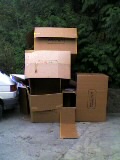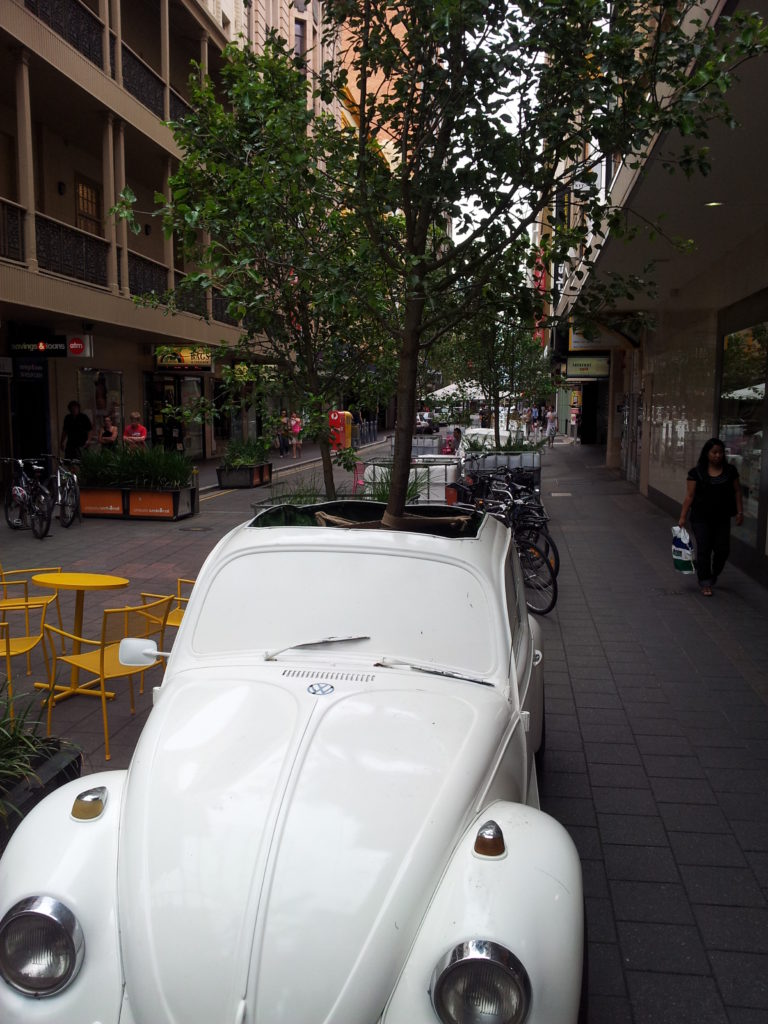My first coaching client was my dad. I told him to fire me.
I should say “client” in quotations because really I was his employee, but this was the earliest manifestation of my affinity for planning and coaching (‘consulting’ I guess is more correct in this case). This is the story of my dad’s family business, and my first job.
Once upon a time…
…Shortly after I was born, in fact, my dad and uncle started a trade selling car parts to local garages. My dad’s whole family are big gear-heads. I did not inherit this, nor a head for engineering (one of my brothers did though). A few years later my uncle left the business to work more directly (physically, as a restorative mechanic) on cars so then it was just my dad in charge.
When we were kids, my two younger brothers and I would be asked to help out occasionally. Many months we’d be given a few pounds to put hundreds of customer statements into envelopes and stamp them. When we were older, we’d help stock-take as Summer jobs, and the Summer that I finished school, I was trained how to do the bookkeeping (and produce the aforementioned statements. How far I’d come…). This became my first real part-time job during my 3 years in University College Dublin, studying for a Bachelors of Commerce degree.
My job title was “accounts”, but seeing as how there were less than 4 employees most of the time, everyone did a bit of everything, so I’d sell car parts too. Basically if the phone rang and someone asked for sales, the other guy (let’s call him Bill) would take it. If the second phone rang while Bill was on the first, suddenly I was sales, but if the question was overly technical or it wasn’t a day-to-day part, I’d usually have to take a message and let Bill or my dad get back to them. This is just how small/family businesses tend to be, I guess.
I dreaded the days when my dad was on the road (as our rep, two days a week) and Bill would call in sick, because not only would I be likely run off my feet answering two phones and dealing with drop-in customers, deliveries, and outbound orders, but my acute lack of mechanical knowledge would really start to show on these days, and I’d have to take notes, ring around, and “get back to you on that” for something that Bill would have known instantly. Sales would slow, customers would get frustrated, and business would suffer. It was just an objective truth that I couldn’t handle the sales end without some serious training. I also just wasn’t that interested in cars. They had no part in what I wanted to do, which at that time looked to be running an events company.
In short, to be part of this small business, it really would have paid to have spent some time working as a mechanic first. Every few weeks we’d seem to be playing catch-up, instead of ever getting ready to grow or expand. But this all didn’t seem to matter too much until the Recession hit!
A Downturn for the Worse!
In the Summer of 2008, the Recession officially came to Ireland. I remember hearing the news report announcing this quite well. It came on the same day that I got the results for my final exams. I thought “I hope this won’t affect me too much”… yeah…
Now finished with college, I was looking around for jobs in my desired field(s), but none were to be found, so I stayed where I was. I switched to full-time hours at first, which allowed Bill and my dad to focus a bit more on business, but a Volkswagen strategic decision (to not allow Main Dealers to purchase parts from 3rd party suppliers like ours) was a major hit to our business.
As financial hardship began to set it around the country (and the world), people were repairing their cars less frequently, and as our customers were feeling the pinch, so soon were we. It took longer and longer to get paid, and in turn we had to stretch out payment to our suppliers as long as possible, risking going on-stop at times. This is where I learned first hand how a company can have a strong balance sheet, but still die on its cash flow.
In my accounts role, I watched month on month as our average bank balance slowly but surely fell, eventually beginning to creep into Overdraft most months, until we basically lived there. This was all against a backdrop of efforts to improve sales like being more proactive with finding new garages in the deep corners of the country, sourcing cheaper parts, building a website, etc. All things that (apart from the website, which didn’t help all that much, since our customers were 90% regulars) I couldn’t help with as I couldn’t speak to mechanics on their level.
Downsizing
Morbidly, one thing did help us survive longer here.
Our van driver, let’s call him Charlie, a plump, hearty, ‘paddy hat’ wearing, gentle and generous old gent whom everyone loved was nearing retirement age. He’d worked for my dad for decades across multiple businesses. He was employed all week but really only needed to be there maybe 10 hours or less with the reduction in business. There was no way my dad was going to let him go (nobody was suggesting it, let’s be clear), but the business wasn’t getting its money’s worth from him any more.
His wife had died a couple years prior, and he lived to work, so nobody, least of all him, had any idea what he’d do when he retired. This is the kind of man who’d never left the country in his entire life (I think he told me he went on a foreign holiday once, but he didn’t like it). Anyway, one evening on his way home, a few months before retirement, Charlie pulled over to the side of the road with chest pains, and died minutes later just a couple of miles from his house.
We were all saddened. All of our local customers knew him well and many came to the funeral. It was a shock to me as I’d known him since I was a toddler, and thought of him as an uncle, but it really was one of those cases where people agreed he may have been better off. He’d have been miserable retired and alone.
Anyway, while Bill got a well-deserved raise after this, and I worked a few more hours to cover the odd collection or delivery (I was part time again at this stage), we managed to save some salary costs from this, but were still on a downward trajectory with no improvement in sight.
The Plan
My dad had ideas on how to save the business, but was also keen to get input from us junior staff (a great Leadership trait – take note). So this is when I first really became involved in strategic business planning, with a company’s very survival actually hanging in the balance. No pressure. My dad’s ideas, all still useful, revolved around marginally reducing costs here, or pushing harder to sell our higher-margin parts, or re-engage with dormant customers.

We really needed to make more sales though. What we needed was a second pro-active sales person who could bring money in and find new business. Bill was great at this, but he was only one man. My dad was having some health problems, and also his interest in the business seemed to be waning, so he wasn’t putting 40 hours in any more either.
He talked as well about moving the premises to a more visible location (we were extremely well-hidden in a private laneway and got no foot-traffic, though this was kind of a blessing, too).
My suggestion: Fire me!
The best answer seemed to be to clone Bill! Have a second full-time sales person. We needed to get someone who had been a mechanic, who was a great people-person, and train them how to do the accounts job I was doing. That way all the company admin would still be taken care of, but we’d always have someone available to be selling, and could probably put another rep on the road to find new business. A couple of new big accounts was all we really needed, though big accounts are hard to find since the franchised main dealers weren’t allowed to buy from us any more, and the independent garages were having a hard time of the recession, too.
So we put out an ad and eventually found a local guy who’d been a mechanic, and was keen to do an accounts + sales role. I trained him up on the accounts. I’d trained both of my brothers at different times (to cover me on Summer holidays or whatever), and had trained Bill on the accounts too, so I was used to having to be really clear, have them take notes, and expect to have to repeat a few things. I did have to repeat some things, but he seemed able to get the job done.
I did notice one disturbing trait, though. He wouldn’t really accept responsibility for making a mistake. It would usually be that “you didn’t tell me that”. But I’m someone who takes excessive responsibility, and if I’m the trainer it is my job to make sure that the message is received correctly, so I just took that as meaning that I hadn’t been clear enough.
Anyway, I’d signed up to do a Sound Engineering course that started in September 2010 (to help in my music/events direction). So I finished training the new guy just in time, and left the business to start on its new direction, while I finally started mine.
So much for that…
I still lived at home, so of course I was on hand to answer clarifying questions through my dad, or even drop into the shop if needs be the odd time. I began hearing how New-Guy wasn’t working out though. My dad seemed to have taken a dislike to him. If I remember correctly, it usually revolved around having to repeat himself to New-Guy excessively, or things not getting done as he expected them done.
So I mentioned how New-Guy wasn’t great at admitting if he’d gotten something wrong? Well, my dad has a very low tolerance for bullshit (namely ‘excuses’, or especially ‘lies’). Turns out those two personalities don’t mix well together. They were quickly finding themselves in daily arguments. My dad’s fuse may have been a little shorter due to the stress of this new business plan needing to work out, but to be fair, there’s little more annoying than someone who blames others for their mistakes.
Well, after just a couple of months, New-Guy was fired. I’m not fully sure what happened, but according to Bill, the guy really wasn’t what we’d hoped at all. My dad asked me to come back part-time. I was able to do this even with my course and still have free time to run events, but it left the company no better off (and I had to give up on learning the piano). I was only working 6 hours a week at this stage (it’s all that was needed of me). Things were bad.
Funny enough, my girlfriend at the time had known of New-Guy before we hired him, and she did not recommend him, but all the other references checked out and he was the best candidate so we went with it (we did seriously need to roll the dice).
The following year I finished my course and, seeing continuing disimprovements in the economy, I moved to Australia with said girlfriend. I trained my youngest brother in to replace me as he was now in college. The business was no better or worse off, but I’d have a chance to finally spread my wings a bit, and my brother would have some income to fund his college life.
The end of the story

This was about my own experience in that family business, and that part of the story really ends there, but for the sake of completion:
When Plan A hadn’t worked out, they all decided to move premises up to a more visible part of the town. It was a big decision with a lot of literal heavy lifting involved (thankfully I was gone at this stage), but it was taking action, and that’s what mattered. Giving the business a chance.
Unfortunately, my dad had a major health scare which took him away from the business for several crucial weeks. Most of our customers only paid when he’d call around the country on the road as our rep, so money wasn’t coming in those weeks. This stressed him further and left us in a worse position. I was back from a year in Australia at this stage and, while not involved in the business, was still happy to look at the numbers, and offer advice. I’d to talk to the Tax Man (who we were now on a first name basis with) as well. Things were grim. My advice (for a long time now) was to shut down the business. It was eating into my dad’s life savings with no sign of turning around.
A few months later he had a second major health scare and the move in premises hadn’t much improved things, so as a family we all decided it would be best to shut it down. Bill was a real asset and had no trouble finding work with our competitors. My youngest brother graduated with a business degree in 2013, when institutions were finally hiring graduates again. He’s never been a day unemployed in his life and has had 5 or 6 really good jobs in as many years.
Retirement suits my dad down to the ground, and his health is doing really well, thank God! And me? Well, I’ve worked in 8 industries in 10 years, am no stranger to being laid off, but have circumnavigated the world, studied tax, taught myself to program, started a games company, worked for the guy who made Doom and Quake, and am now a business coach. Go figure.
In Conclusion
So, at the tender age of 21, I’d my first real exposure to strategic planning for a small business, and to consulting/coaching. Even then, I knew that Movement Beats Meditation, meaning that we couldn’t just make incremental changes and hope, or spend excessive time “wait and see”-ing. We were in trouble and we had to decide on an action plan and just take the chance.
My move to Australia was another drastic action necessitated by circumstance. As hard as I find it to believe now, I truly never wanted to go to Australia at the time. It just seemed the best move for myself and my girlfriend then. Sometimes a risky action is just what it takes. Although, it’s nicer when the downside isn’t so drastic as my first experiences were, and nicer still the times it works out. This just wasn’t one of those times. It’s a real story. Businesses fail.
I also was willing to admit when I was the problem and get out of the way, even if it meant a lower standard of living for myself. I think this is an important skill to have, and I’m sure to have my clients reflect on this in their own situations to see if it rings true.
This post was a bit long in the tooth, but if you’re interested in my time in Australia, my tax-studying history, or how I got into games, see this post on my old games website. If you’d like to know how it worked out with that girlfriend or why I got out of my games company, see this follow-up post.
Thanks so much for reading. Do please leave a comment if you got some value out of this.
Talk to you soon…

